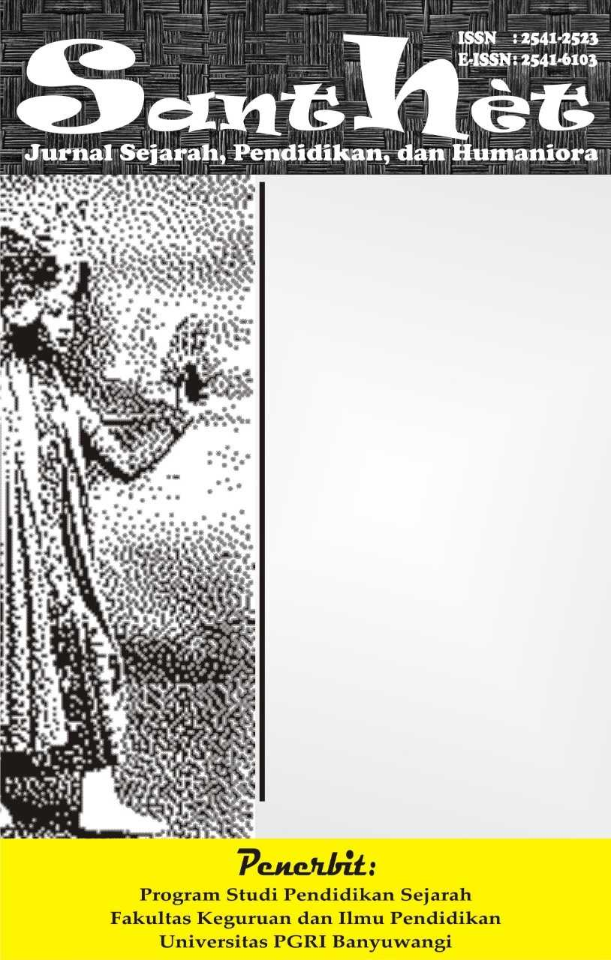The Behavior of Aggressive Inmates: A Case Study of Robbery Offenders in Surabaya
Gambaran Perilaku Agresif Pada Narapidana Pelaku Perampokan di Surabaya
DOI:
https://doi.org/10.36526/santhet.v8i2.4525Keywords:
Aggressive behavior, Robbing, Robbery, General Criminal OffensesAbstract
Crime that has been occurring frequently lately in society is the criminal act of theft, which is highly disturbing. Violent theft is commonly known as robbery. It differs from regular theft in that it involves intentionally causing physical harm. Behavior that deliberately harms others can be termed as aggressive behavior. Aggressive behavior involves intentionally causing physical or psychological harm to someone, with potentially detrimental effects. This research aims to understand the description of aggressive behavior among robbery perpetrators in Surabaya. The researcher utilized Interpretative Phenomenological Analysis (IPA) and validated the data through triangulation, data validation, member check, and rechecking of themes. The methods employed included observation, interviews, and documentation, with thematic analysis used as the data analysis technique. During the interviews, the researcher identified three major themes: understanding specific terms, experiences behind bars, and comprehending from a comparative perspective. Additionally, a unique theme emerged related to the concept of power. The findings of this research reveal a depiction of aggressive behavior among robbery perpetrators.
References
Alwisol. (2019). Psikologi kepribadian. Universitas Muhammadiyah Malang.
Anggraini, W., Rifani, E., & Prasetyo, A. (2023). Faktor-faktor penyebab perilaku agresif pada remaja : studi literatur. Jambura Guidance and Counseling Journal, 4(1), 39–44.
Boucher, G. (2021). The Frankfurt school and the authoritarian personality: Balance sheet of an insight. Thesis Eleven, 163(1), 89–102. https://doi.org/10.1177/07255136211005957
Breakwell, G. M. (1997). Coping with aggressive behavior. Leicester, UK: British Psycological Society.
Buss, A. H., & Perry, M. (1992). The agression questionnaire. Journal of Personality and Social Psychology, 63(3), 352–459. https://doi.org/10.1007/978-3-319-28099-8_809-1
Calvin S. Hall, G. L. (1993). Teori-teori sifat dan behavioristik (A. Supratiknya (ed.); 8th ed.). Kanisius.
Creswell, J. W. (2021). Research design (Cetakan V). Pustaka Pelajar.
Diron, A. Z., Dharsana, I. K., & Suarni, N. K. (2023). Pengaruh konseling behavioral fengan teknik self control dalam meminimalisir perilaku agresif peserta didik kelas xi mipa di SMA Negeri 4 Singaraja. Jurnal EDUCATIO: Jurnal Pendidikan Indonesia, 9(1), 446. https://doi.org/10.29210/1202323016
E.Koeswara. (1988). Agresi manusia (S. W. Sarwono (ed.)). Eresco.
Faiqoh, E., & Falah, F. (2023). Hubungan antara sikap terhadap pasien penyakit jiwa dengan perilaku agresif perawat pasien penyakit jiwa. Proyeksi, 6(1), 89–99. https://doi.org/10.30659/p.6.1.89-99
Fitri Malau, T., Lumiam Sinaga, Y., Silitonga, R. L., Padang, S. A., Gultom, H. S., Widiastuti, M., & Tarutung, I. (2023). Studi kasus peserta didik yang bertingkah laku agresif di salah satu sekolah sma. Jurnal Inovasi Ilmu Pendidikan, 1(1). https://akper-sandikarsa.e-journal.id/JIKSH.
Fraser, M. W., Thompson, A. M., Day, S. H., & Macy, R. J. (2013). The making choices program: Impact of social-emotional skills training on the risk status of third graders. Elementary School Journal, 114(3), 354–379. https://doi.org/10.1086/674055
Hasina, Y. F., Sari, P., & Zuhri, K. H. S. (2023). Bimbingan rohani sebagai reduksi stres pada narapidana Undang-undang. 02(2), 33–45.
Hergenhahn, & Olson, M. (2017). The theories of learning (Ke-6). PT Fajar Interpratama Mandiri.
Janah, A. I., & Diana, R. (2023). Dampak negatif gadget pada perilaku agresif anak usia dini. Jurnal Pendidikan Islam Anak Usia Dini, 6(2), 21–28.
Juhi. (2023). Konseling individu dengan teknik self-management untuk mengurangi perilaku agresif pada santri (studi kasus klien “A” yang menjadi korban broken home). Educational Journal, 3(2), 246–257.
Kholifah, U. N., Dinata, K. I., & A, B. D. C. (2023). Understanding the relationship between spirituality and psychological well-being : A literature review from a transpersonal perspective. Agustus, 27–36.
Levinson, D. (1957). Authoritarian personality and foreign policy. Journal of Conflict Resolution, 1(1), 37–47. https://doi.org/10.1177/002200275700100105
Levitt, H. M. (2020). Reporting qualitative research in psychology: How to meet APA Style Journal Article Reporting Standards (Revised Edition). In Reporting qualitative research in psychology: How to meet APA Style Journal Article Reporting Standards (Revised Edition). https://doi.org/10.1037/0000179-000
Mil, S., & Ningsih, A. S. (2023). Pengaruh pola asuh otoriter terhadap perilaku agresif anak. Aulad: Journal on Early Childhood, 6(2), 219–225. https://doi.org/10.31004/aulad.v6i1.500
Misno, & Malini Lubis, F. (2023). Pengaruh pendidikan agama, konsep diri, kepribadian, dan lingkungan sosial terhadap perilaku agresif remaja di Provinsi Jawa Barat. Jurnal Psikologi Dan Konseling West Science, 1(02), 118–130. https://doi.org/10.58812/jpkws.v1i02.263
Navas-Casado, M. L., García-Sancho, E., & Salguero, J. M. (2023). Associations between maladaptive and adaptive emotion regulation strategies and aggressive behavior: A systematic review. Aggression and Violent Behavior, 71(July 2022). https://doi.org/10.1016/j.avb.2023.101845
Pasiska, P. (2018). Konsep manusia dan komunikasi dalam persepektif psikologi transpersonal dan Islam. INJECT (Interdisciplinary Journal of Communication), 3(2), 273. https://doi.org/10.18326/inject.v3i2.273-292
Publik, S. (2023). Laporan jumlah penghuni lembaga pemasyarakatan, rumah tahanan negara, lembaga pembinaan khusus anak, lembaga pemasyarakatan perempuan. Ditjenpas. https://sdppublik.ditjenpas.go.id/
Rahail, B. E., & Alamsyah, M. F. (2023). Implementasi pemenuhan hak-hak narapidana pada lembaga pemasyarakatan di tinjau dalam perspektid hak asasi manusia. Jurnal Restorative Justice, 7(2).
Rakhmat, J. (2015). Psikologi komunikasi. Simbiosa Rekatama Media.
Rozalina Yuliyanti, E. (2019). Psikologi transpersonal fakultas Ushuluddin Uin Sunan Gunung Djati Bandung. 127.
Sarwono, S. (2015). Psikologi lintas budaya (Cetakan ke). PT Rajagrafindo Persada.
Sarwono, S. W. (1983). Teori-teori psikologi sosial. Rajawali Pers.
Siegel, K., Cabán, M., Brown-Bradley, C. J., & Schrimshaw, E. W. (2023). Male sex workers’ strategies to manage client-related risks of violence. Journal of Interpersonal Violence, 38(19–20), 10814–10838. https://doi.org/10.1177/08862605231176804
Thomas, C., & Wolff, K. T. (2023). Weird winter weather in the Anthropocene: How volatile temperatures shape violent crime. Journal of Criminal Justice, 87(May), 102090. https://doi.org/10.1016/j.jcrimjus.2023.102090
Willig, C., & Rogers-Stainton, W. (2017). The SAGE handbook of qualitative research in psychology (B. Taylor (ed.)). Sage Publications. https://doi.org/10.4135/9781848607927.n20
Wüllenweber, S., & Burrell, A. (2023). The crime and the place: Robbery in the night-time economy. Journal of Investigative Psychology and Offender Profiling, May, 1–17. https://doi.org/10.1002/jip.1616
Yuris, E. (2023). Dampak penggunaan internet terhadap perilaku agresif pada anak. UNES Journal of Scientech Research, Economic R(01), 114–120.





























